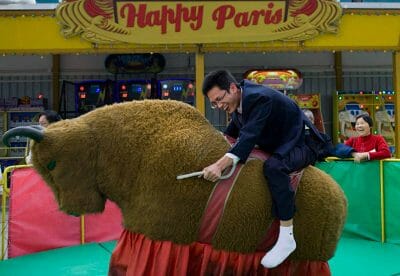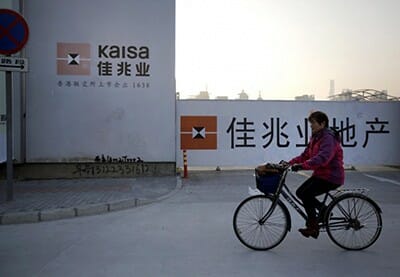
China’s growing theme park sector may as well be a rodeo and Kaisa is hoping it doesn’t get thrown off the bull
It’s hard to blame troubled developer Kaisa Group for wanting to have a little fun. After two turbulent years, which saw the homebuilder run into trouble with the Shenzhen government and default on loans before finally restructuring its debts, the developer decided now was the time to get involved in China’s growing theme park sector.
The Shenzhen-based developer this week revealed plans to build a RMB30 billion ($4.4 billion) international theme park in eastern Shenzhen that it hopes will open in 2020. The Golden Bay International Amusement Park will feature hotels, a water park, a movie theatre and an animation city, as well as all the rides and games a family could hope for.
With prices surging to record levels in Shenzhen, Kaisa has begun to emerge from its darker days recording RMB 26.4 billion ($3.8 billion) in contracted sales during the first ten months of this year. However, even those positive totals aren’t enough to convince some that the Hong Kong-listed developer, whose shares have been suspended from trading since March 2015, should be dabbling in entertainment.
It will be difficult for Kaisa to come up with the necessary funding in its current situation, Zhang Hongwei, a research director at the Shanghai-based Tospur Real Estate Consulting told the South China Morning Post. He added it could be possible that the local government could support Kaisa on the project, but there are no indications that this is going to happen.
Following Wanda’s Lead To Acquire Free Land
If Kaisa is jumping into the theme park business thinking it will be all fun and games, they have another thing coming. A number of heavyweights, including Dalian Wanda, are building or have plans to build theme parks across China in the coming years.
Wanda chairman Wang Jianlin has already committed $47 billion to building new theme parks in cities such as Changsha, Xi’an, Wuhan and Hefei. While not the sexiest destinations, China’s richest man believes quantity and not quality is the best way of achieving his goal of putting Disney out of business.
However, there are some special economics underpinning Wang’s passion for theme parks that could attract developers such as Kaisa to follow Wanda’s lead. With local authorities eager to spark economic growth and collect taxes from service businesses, analysts familiar with Wanda’s transactions have reported to Mingtiandi that the developer has received residential land at heavy discounts, or even free, in return for promising to build parks in second or third-tier cities.
Kaisa Sees Light And Roller Coasters At End Of The Tunnel

After defaults and the Shenzhen government blocking sales, Kaisa seems to be turning the corner
The saga of Kaisa gripped China at the start of 2015. The developer fell into technical default on a commercial loan in January of that year before the other shoe fell and it defaulted on $52 million of interest payments on offshore bonds worth $800 million a few months later.
While some experts predicted the default would be the financial end of days for the country’s property industry, the real issue was the Shenzhen government blocking sales at a number of the developer’s projects. Local authorities eventually lifted the sales ban on the bulk of its properties at the start of this year.
In May, bondholders finally approved the Shenzhen-based property developer’s offshore debt restructuring plan and the firm’s sales of been strong throughout this year. In October, total contracted sales at Kaisa were RMB3.73 billion ($541.4 million).
Leave a Reply